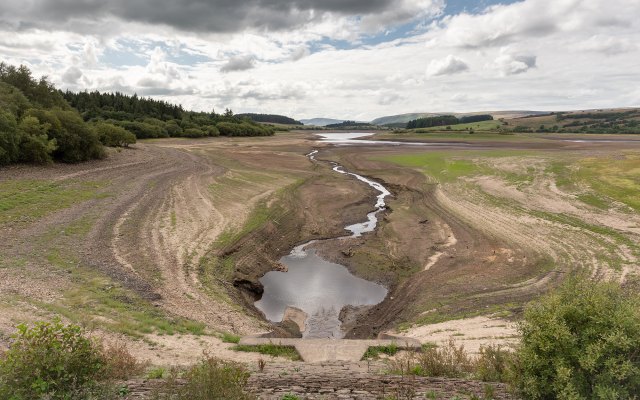News
Winter Water Resources FAQs
Updated 8 November
After a record-breaking hot and dry summer, much of England and Wales is still recovering from drought, with Temporary Use Bans (or hosepipe bans) still in place in some areas. The below FAQs explain more about the current situation and why these restrictions remain.
What is the current situation?
- Three companies (South East Water, South West Water, and Yorkshire Water) have localised Temporary Use Bans (commonly called Hosepipe Bans) in place in all or part of their regions.
- 11 out 14 areas of England remain officially in drought according to the Environment Agency and Natural Resources Wales.
- This follows unprecedented weather conditions this year, with the driest summer on record for many parts of England.
- The summer heatwave also led to record-breaking levels of demand with water many companies having to produce hundreds of millions of litres of extra water each day, equivalent to adding multiple additional towns of people to the network.
- At the end of September, reservoir stocks in England were at their lowest levels on record.
- Despite recent wet weather and most rivers returning to normal flows, many of England’s reservoirs and underground aquifers remain low.
- This means that we need a wetter than average winter in order to replenish stocks.
- We continue to urge everyone to carefully consider the amount they are using this winter, in order to give our reservoirs and rivers the best chance of recharging.
- The water industry is running a national water saving campaign called Water’s Worth Saving that provides the public with helpful hints and tips on how to do their bit with water use in the home and garden
It’s raining, so why are Temporary Use Bans still in place?
- This has been one of the driest years on record, and recent downpours, while welcome, have done little to make up for 10 months of dry, and exceptionally hot weather.
- Above average levels of rainfall this winter will be required to bring water levels in the environment back to normal.
- Hosepipe bans are rarely needed but their implementation over the summer, and the fact much of Southern England still have restrictions in place, shows how serious conditions have been in 2022
- While it may seem strange to have restrictions on water use over the winter water companies recognise the need to keep as much water in the environment. Even during inclement weather temporary use bans can still play a positive role in reducing the amount of water people use
- A dry winter could cause problems with supply next year. For example, just 20% less rainfall than a normal winter could see large parts of the country at risk of drought continuing into next summer.
When will restrictions be lifted?
- Water companies are constantly reviewing data, including groundwater and river levels, in deciding whether a Temporary Use Ban is still needed in their region.
- The length of a ban, and when it is lifted, will vary from region to region.
- Welsh Water and Southern Water have been able to lift restrictions due to their situation improving, but four companies in England have, so far, retained their restrictions until the data shows that they can be lifted.
- Each company will keep customers informed of any changes.
What needs to happen over the winter to restore supply?
- Due to 2022 being an extremely dry year, more rain than normal will be needed this winter in order to restore supplies to normal levels by spring next year.
- Even average winter rainfall may not be enough for underground aquifers in some areas to be fully restocked.
- If this winter sees 20% less rain than in an average winter, large parts of the country will be at risk of drought continuing into the summer.
- That is why companies are taking steps to give water sources the best chance of replenishing, in case winter does not deliver enough rainfall.
- That includes following pre-agreed drought plans, as well as implementing measures to reduce customer demand, and increased leakage management.
- A number of companies have also applied to the Environment Agency for drought permits – to move water around to where its most needed – to improve levels over the winter ready for next year.
Are we likely to see restrictions next year?
- It is too early to say but if this winter does not deliver above average rainfall then it is likely that parts of the country will still be in drought in the New Year. In that scenario it is more likely that restrictions will be needed on water use during the summer
What are the restrictions? What is allowed and not allowed?
- In simple terms, in areas covered by a temporary use ban residents may not use a hosepipe or equivalent device for domestic purposes (for example, filling paddling pools, watering gardens, or cleaning buildings, cars or decking).
- It is important to check with the relevant water company for specific details. Each company has provided good and comprehensive guidance on their websites and in other communications.
- Details for South East Water restrictions
- Details for South West Water restrictions
- Details for Yorkshire Water restrictions
Not sure who your water company is? Click here to find out.
What are companies doing to improve the situation?
- In the short-term, companies are taking a range of measures to help everyone leave more water in the environment.
- These include communications campaigns urging customers to reduce their water use, free home visits to fix leaky loos, and offering free water-saving devices.
- Some companies are also offering discounted rates to business customers who substantially reduce their usage.
- In the long-term, each company has developed a 25-year plan to ensure water demand and supplies remain balanced, and the risk of future drought continues to reduce.
- The industry has also developed 18 major, cross-country projects that together would deliver enough water for 10 million people. With a cost of around £14billion, projects include major water transfers (for example, from the River Severn to the River Thames, or via the Grand Union Canal) as well as new reservoirs. These are currently under scrutiny from regulators.
What can customers do?
- Everyone can play their part by being careful about the amount of water they use.
- Our national water saving campaign – Water’s Worth Saving – has helpful hints and tips on how to reduce water use in the home and garden.
- The campaign is being extended over winter to help customers to continue reducing their water usage during the winter months, while also saving money on their energy bills by reducing the amount of hot water they use.
What about the water wasted through burst pipes and leaks?
- Previous winter events like Storm Arwen have taught us that customers need our help to avoid frozen pipes that burst in winter and cause leaks around their properties. Our winter campaign highlights the benefit of lagging cold pipes.
- England is currently seeing the lowest ever leakage in history, having reduced it by over a third since the 1990s. In the last few years alone leakage has fallen across the sector by 11%.
- There are further steep reductions planned each year for the rest of this decade, with very significant penalties if companies miss targets. Companies will spend nearly one and a half billion pounds on leakage between 2020 and 2025.
- This progress has seen our performance race ahead of other countries like Ireland and Italy, and start to overtake countries like France.
- Teams are increasingly using advanced technology like intelligent networks and smart sensors, artificial intelligence, and satellite and drone technology to detect leaks, and new advanced techniques to repair them quickly – sometimes without even needing to dig up the road.
Why haven’t you just built more reservoirs?
- Keeping pace with climate change requires a number of responses, including new resources such as reservoirs, but other schemes can be effective too.
- The water industry has completed a large number of major schemes in recent decades to move water from the most sustainable sources to where it’s needed most.
- Projects have included the Birmingham Resilience scheme, Bristol Water’s Southern Resilience Scheme, £230million of investment by Wessex Water on a grid to move water to where it’s most needed and reduce abstraction from chalk streams, and investment by Affinity Water to end unsustainable abstraction from chalk groundwater to help protect the region’s globally rare chalk streams.
- On top of those, companies have put forward a number of proposals for reservoirs in the past, but they are always subject to scrutiny from regulators about their near-term need and value for money, as well as planning permission. A number have been refused permission to proceed on that basis.
- That scrutiny process, and planning permission for projects, is long and very complex. However, one reservoir – at Havant Thicket – has made excellent progress and is due to be completed before the end of the decade. This will protect the River Test and River Itchen – both of which are sensitive and important chalk streams. It is under development by Portsmouth and Southern Water and will hold about 8.7 billion litres of water.
- Companies have made a further 18 proposals, which are now under consideration in a new arrangement introduced by regulators to speed-up and facilitate their decision-making, and make it more likely that projects can proceed. These schemes – strongly supported by industry – would deliver new drinking water for 10 million people and are an essential part of providing the 3.5billion litres or more of water needed by 2050 due to population growth and climate change.
- The Government has also committed to finalising new arrangements by the end of the year that should streamline the process of gaining planning permission for nationally significant water projects.
- Saving water will still be important especially in periods of hot and dry weather.
What should I do if a neighbour is doing something prohibited by a Temporary Use Ban? Will you fine them?
- Most people tell us that they understand the importance of conserving water and will follow the rules.
- However, if on the rare occasion that you know someone who isn’t, you may wish to politely remind them of the restrictions in force, the activities covered, and that restrictions are in place to protect rivers and safeguard water supplies. Using hosepipes in areas under restriction puts much more pressure on the environment at a time when that is more likely to do damage.
- Companies do have enforcement powers, and if they have to then they can ultimately impose fines on anyone breaching the rules. But they will always prefer to first offer advice, explanation, encouragement and support, and will be taking a pragmatic approach.





